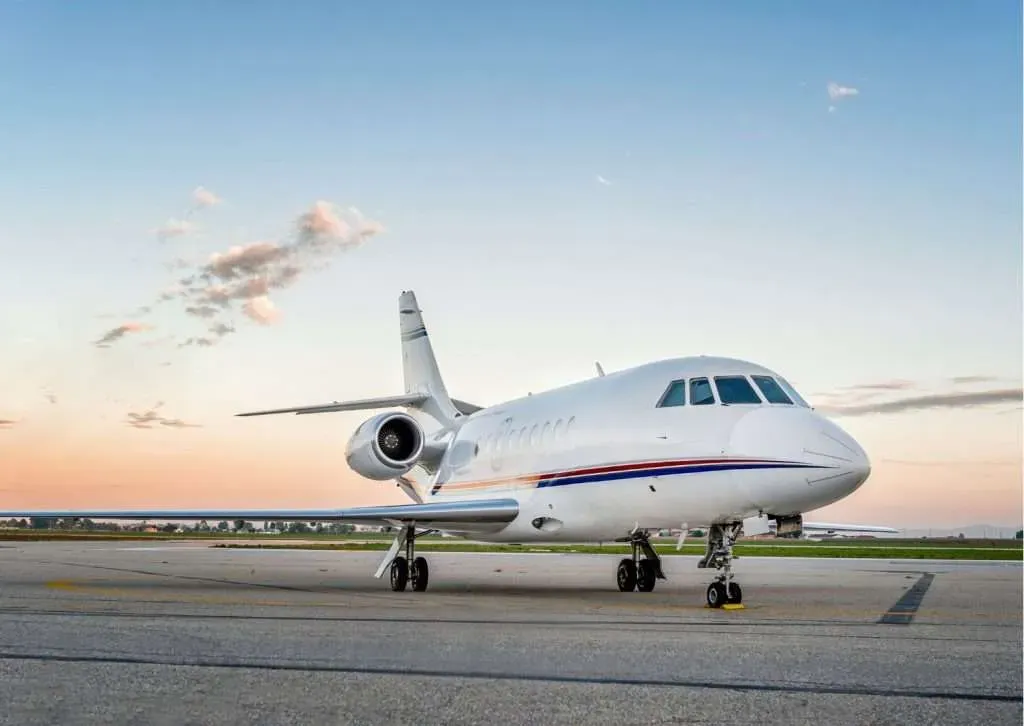Private jet demand has encountered a notable decline, sparked by growing economic uncertainty that has deterred even the most affluent travelers. A recent survey by Barclays reveals a staggering 49% drop in customer interest for private jet sales since March, highlighting a shift in priorities among wealthy individuals. As confidence in the economy wavers, many are expressing hesitation towards aircraft purchases, largely due to the looming impact of tariffs on jets and their operational costs. This trend is particularly evident in the business jet market, where buyers are increasingly wary of making significant investments. Without a revival in consumer sentiment and assurance against tariffs, the private aviation sector may face prolonged challenges in attracting new customers and sustaining growth.
The current landscape for luxury air travel is witnessing a downturn, as demand for personal aircraft experiences a significant dip. The hesitance among high-net-worth individuals to indulge in exclusive air travel reflects broader economic concerns affecting their spending habits. The challenges posed by tariffs and fluctuating market conditions are leading potential buyers in the aircraft industry to reconsider their investment strategies. What was once a booming segment catering to the desires of affluent travelers is now under pressure, as many contemplate the financial implications of purchasing a business jet. As we delve deeper into this situation, it’s clear that external factors are reshaping the dynamics of aircraft demand and influencing consumer decisions.
Understanding Private Jet Demand in Today’s Market
In recent months, private jet demand has seen a notable decline, heavily influenced by economic uncertainty. According to a survey by Barclays, interest in the purchase of business jets has plummeted by 49% since March, a statistic that highlights the cautious approach affluent travelers are now adopting. Economic indicators suggest that even the wealthiest individuals are retreating from big-ticket purchases, with factors such as tariffs looming large in their decision-making processes.
The Barclays Business Jet Indicator survey sheds light on this trend, emphasizing that customer sentiment has shifted dramatically. The comprehensive survey, which included insights from 65 business jet broker-dealers and financiers, reveals that a composite score measuring market health dropped from 52 to 40—signifying a concerning slowdown. This notable decrease reflects an increasingly pessimistic outlook among potential buyers, influenced perhaps by broader economic challenges and volatility.
The Impact of Tariffs on Private Jet Sales
Tariffs have acted as a significant deterrent to would-be buyers in the business jet market, as highlighted by the Barclays survey findings. A staggering 93% of respondents indicated that the ongoing tariffs would negatively impact demand for new aircraft. This pervasive concern prompts potential buyers to hesitate in making purchases, foreseeing not just the immediate impact on costs but also the long-term implications for their operational businesses. As builders of luxury aircraft, manufacturers must navigate these challenges, which have created an atmosphere of uncertainty.
Moreover, the uncertainty surrounding tariffs has led to a hesitance among affluent travelers. Almost half of the survey participants reported a decline in consumer interest—a signal that economic conditions are severely affecting even the most financially capable individuals. The result is a strong reluctance to commit to purchases that can involve significant capital, creating a ripple effect in the overall market for private jets.
Forecasting the Business Jet Market’s Future
Looking ahead, the future of the business jet market remains uncertain, primarily due to factors affecting both private jet demand and consumer confidence. The significant decline in the Barclays Business Jet Indicator underscores this uncertainty, reflecting that potential buyers might be more willing to postpone purchases until conditions stabilize. Trends in aircraft purchase hesitation indicate that buyers are increasingly discerning, focusing on value and necessity over luxury—an evolution in buyer behavior that could permanently alter market dynamics.
However, there is potential for a rebound should legislative changes occur. There have been discussions in Congress around reinstating a significant tax deduction for aircraft purchases, an incentive that could rejuvenate interest among buyers. If the proposed Tax Cuts and Jobs Act extensions succeed, allowing for 100% deductions on eligible equipment purchases, the appeal for private jets may be revitalized. Such developments will be crucial in determining whether the recent downturn in private jet sales remains a passing phase or signals a longer-term trend.
Challenges Facing Affluent Travelers in Aircraft Purchases
Affluent travelers who traditionally invest in private jets are encountering numerous challenges exacerbated by economic uncertainty. The Barclays survey revealed that nearly half of the participants noted a decline in client interest in purchasing business jets due to concerns regarding tariffs and their potential influences on pricing and operational costs. This situation reflects a broader trend among wealthier individuals who are increasingly weighing economic indicators before making substantial investments.
The high costs associated with owning and operating a private jet can deter purchase intentions, particularly when financial stability is in question. As affluent travelers face these renewed hesitations, industry stakeholders must adapt their strategies to address the shifting landscape, focusing on providing value propositions that align with potential buyers’ concerns. This may involve highlighting operational efficiencies and long-term benefits of private jet ownership, countering the immediate apprehensions brought on by economic pressure.
Potential Legislative Changes Affecting Aircraft Purchases
Possible legislative changes may significantly influence the business jet market by creating incentives for purchases that are currently being postponed. The proposed extensions to the Tax Cuts and Jobs Act could allow for 100% deductions on qualified business equipment, which includes aircraft. This could be an important catalyst for affluent buyers who are hesitating, as it would reduce the overall cost burden associated with purchasing and operating a private jet.
With the tax incentives restored, many potential buyers may reevaluate their hesitance to enter the private jet market. The favorable financial implications could stimulate demand, benefiting manufacturers and mitigating the decline noted in consumer interest. If Congress proceeds to support these measures, the strategic reintroduction of tax benefits could attract affluent travelers back to the business jet market, rekindling interest and driving sales in a sector that has recently shown signs of stagnation.
Market Trends Influencing Private Jet Demand
Understanding market trends is crucial for grasping the factors influencing private jet demand. The recent Barclays survey indicates that the business jet market is currently facing significant headwinds, including a notable decrease in customer inquiries and serious concerns over tariffs that are clouding buyer sentiment. As financing options become more restrictive and economic confidence wanes, the landscape for private jet sales is being reshaped, enforcing a behavior shift among affluent travelers.
Additionally, trends suggest that the luxury that private jets represent may be seen as less essential during periods of economic uncertainty. This transitional sentiment impacts how manufacturers and brokers approach prospective deals, placing an emphasis on flexible pricing structures and enhanced customer engagement strategies. The ongoing dynamics in the business jet sector demonstrate how external pressures can indirectly affect consumer choices, making it imperative for industry players to adapt to the changing realities.
Responses from Aircraft Manufacturers to Market Slowdown
In response to the downturn in demand for private jets, aircraft manufacturers are employing various strategies to mitigate the impact of reduced sales. Some are focusing on product innovation and enhancing the capabilities of existing models to attract buyers despite economic uncertainties. By introducing advanced technologies and offering personalized features, manufacturers hope to appeal to the discerning affluent customer base looking for more than just luxury but also better value and performance.
Additionally, manufacturers are reassessing their marketing strategies to better engage potential buyers. This may involve modifying target demographics, emphasizing the long-term benefits of ownership, and providing insights on how private jets can serve as operational assets in a business context. Building relationships through education and personalized customer interactions will be crucial in rebuilding interest amid the current climate of uncertainty.
The Role of Financing in Private Jet Purchases
Financing plays a pivotal role in the decision-making process for individuals considering private jet purchases. With economic factors influencing buyer confidence, the availability and terms of financing can determine whether potential buyers move forward with acquisitions. In the current market, where uncertainty prevails and consumer sentiment has dipped, buyers are scrutinizing financial options more than in the past, weighing their costs against anticipated returns.
The willingness of lenders to provide favorable terms is vital in stimulating interest among affluent travelers. When financing conditions are competitive, buyers may feel more encouraged to invest in an asset as luxurious yet practical as a private jet. Consequently, brokers and manufacturers should focus on facilitating strong relationships with financial institutions to create attractive financing options that cater to diverse financial profiles, aiming to alleviate the hesitation many clients are currently experiencing.
Lifestyle Changes Among Affluent Travelers
Lifestyle changes among affluent travelers significantly influence private jet demand. With increased remote work and changing travel behaviors due to the pandemic, many potential customers are reassessing how and when they utilize private aviation services. This shift may lead to a reduction in overall travel frequency, thereby impacting demand for business jets as travelers prioritize essential journeys and limit discretionary travel.
Moreover, affluent travelers are now more attuned to the value proposition of private jets—prioritizing efficiency, accessibility, and tailored experiences over mere luxury. This evolution necessitates that manufacturers and service providers adapt their offerings to align with the new expectations of their clientele. Providing comprehensive travel solutions and enhanced amenities could be critical to retaining interest in the private jet market amid changing societal trends.
Frequently Asked Questions
What factors are contributing to the decline in private jet demand?
The decline in private jet demand can mainly be attributed to economic uncertainty, as even affluent travelers are becoming hesitant to make significant investments. A recent Barclays survey noted a 49% decrease in interest for business jet purchases since March, primarily influenced by concerns over tariffs and their potential impact on operational costs.
How have tariffs impacted the business jet market?
Tariffs have had a profound negative impact on the business jet market, with 93% of survey respondents acknowledging that tariffs would reduce demand for new aircraft. Many potential buyers are deferring their purchases due to worries about how these tariffs might affect their businesses and aircraft ownership costs.
What do recent trends in private jet sales indicate about affluent travelers’ behaviors?
Recent trends show that affluent travelers are scaling back their spending on private jets. According to the Barclays survey, client interest in purchasing business jets has dropped significantly, showcasing a broader retreat among high-net-worth individuals amid economic instability.
Is there any potential for recovery in the private jet demand amid the economic challenges?
Yes, there is potential for recovery in private jet demand if pending legislation moves forward. Congress is considering reinstating a 100% bonus depreciation for eligible aircraft purchases, which could make buying business jets more attractive from a tax perspective, possibly revitalizing interest in the market.
What do purchasers of business jets need to consider regarding their investment in the current market?
Prospective purchasers of business jets need to consider the current economic landscape, particularly the uncertainties tied to tariffs. Given the significant 49% drop in interest and the negative sentiment among potential buyers, it’s crucial to evaluate their financial strategy and readiness to invest in a depreciating asset.
How does consumer confidence influence private jet demand?
Consumer confidence plays a crucial role in private jet demand. As confidence wanes, even affluent customers are hesitant to commit to large purchases, leading to declines in private jet sales. The recent Barclays survey highlights this relationship, showing that declining consumer sentiment is closely tied to the downturn in business jet interest.
What can we expect for the future of private jet demand if the economy stabilizes?
If the economy stabilizes, we might expect a rebound in private jet demand. Increased consumer confidence, coupled with possible tax incentives for purchases due to legislative changes, could lead affluent travelers to revisit their interest in acquiring business jets, reversing the current downward trend.
| Key Point | Details |
|---|---|
| Economic Uncertainty | Affluent travelers are retreating from purchasing private jets due to economic concerns, as indicated by a Barclays survey. |
| Decline in Interest | Interest in buying business jets has dropped by 49% since March, with consumer confidence diminishing. |
| Impact of Tariffs | 93% of respondents believe tariffs will negatively affect new aircraft demand, with expectations of a significant impact. |
| Legislative Support | Pending legislation aims to extend 100% tax deductions for eligible equipment purchases, which could boost private jet demand. |
Summary
Private jet demand is facing a notable decline as affluent travelers grow wary amidst economic uncertainty. Recent surveys suggest a 49% drop in interest for private jet purchases, emphasizing a retreat from this luxury market. However, changes in legislation regarding tax deductions may provide a potential boost for private jet manufacturers in the future.



